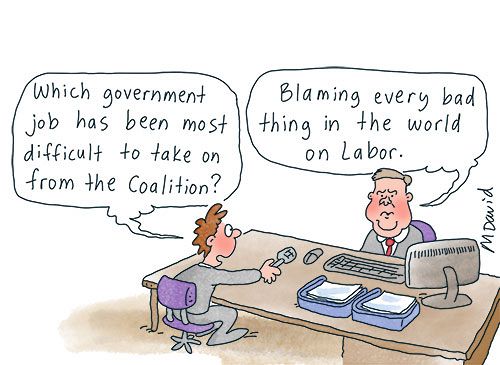Poor decisions by incompetent regimes have caused lasting harm in Australia, though the mainstream press would never admit it, Alan Austin reports.
TEN YEARS AGO this column tentatively advanced the proposition that wrong decisions could permanently impair national economies. That hypothesis has been emphatically validated.
The key observation in May 2014 was that different responses to the onset of the Global Financial Crisis (GFC) in 2008 resulted in vastly contrasting outcomes. Some governments fortuitously averted economic disaster. Poor decisions in other countries led to severe job losses, deep recession, widespread bankruptcies and thousands of suicides.
That article lamented that six years after the crisis, Spain, Hong Kong, Ireland and other countries had still not seen their jobless rates return to pre-GFC levels.
As we know, the costs of long-term unemployment are enormous, including poverty, low self-worth and wasted human capital.
Case study: Spain
Spain’s jobless rate was below 9% from mid-2005 to the end of 2007 — not brilliant, but historically low. This surged alarmingly through the GFC to peak at 26.9% in 2013. There was no sign of returning below 9% when that analysis was published in 2014.
So, looking back over the ten years since then, when did Spain’s jobless eventually return to normal, below 9%? The dismal answer is that it still hasn’t after 17 years. The latest rate, last December, was 11.8%.
Spain’s weak and tardy responses to the GFC – which included gross mismanagement of a housing bubble – were clearly ill-advised. Spain is not alone.
Case studies: Greece and Lithuania
Greece’s jobless rate in early 2008 was 7.7%. Following the crisis, this hit 28.3% in 2013. The lowest since then was 10.4% in January this year.
Lithuanians suffered worse. Their jobless rate in June 2007 was an impressive 2.7%. This peaked in 2010 at 15.3%. The lowest since then was 7.2% in September 2016. The current rate is 9.3%. When will they see 2.7% again? Possibly never.
So the hypothesis seems validated. The wrong calls can lead to irreversible – or at least very long-term – harm. This was not inevitable, as proven by countries that applied faster and better-targeted stimulus and maintained tax revenues to keep budgets in reasonable balance.
Case study: Australia
Australia under former Prime Minister Kevin Rudd was the stand-out success, with the jobless below 5.0% throughout 2007 and 2008. It peaked at just 5.86% in June 2009, then returned below 5.0% in December 2010, where it stayed for most of the next six months.
Accolades for Rudd and his Treasurer Wayne Swan from economists, world leaders and others now number over 160, as archived here.
Other developed economies which saw reasonably rapid returns to pre-GFC jobless rates include Japan, Israel, Switzerland and the USA.
Permanent damage to Australia’s debt
This column has tracked the harm to Australia’s economy through the nine disastrous Coalition years, culminating in the list of 60 worst-ever outcomes – or worst in a long time – published here two years ago.
Of those, arguably the most damaging was the addition of more than $265 billion in gross debt between December 2013 and December 2019, pre-COVID-19.
Those six years were the global boom period during which well-managed economies repaid the debt needed during the GFC. These included Germany, Ireland, Iceland, the Netherlands, Czechia and Portugal. Ireland reduced its debt over that period from 120% of GDP to just 57.1%.
With its commodities boom continuing apace, Australia needed no debt. The Coalition’s economic incompetence from the outset was so dire that both former PM Tony Abbott and Treasurer Joe Hockey were sacked within two years — by their own side.
Unfortunately, replacement Treasurer Scott Morrison generated worse outcomes than Hockey — and his replacement, Josh Frydenberg, produced worse results again.
Under Frydenberg, more unnecessary debt was incurred when the COVID-19 recession demanded moderate stimulus spending. True to form, the Coalition’s quantum was too high and very poorly targeted. Between December 2019 and the 2022 election, another $327 billion was borrowed, about two-thirds of which was wasted.
The total gross debt added by the Coalition over its nine years was $617 billion — very little if any, justifiable. Of the 38 Organisation for Economic Co-operation and Development (OECD) members, Chile and Australia were the only ones to double their debt to GDP in that period.
Australian taxpayers must service that debt for decades to come. The interest bill in 2021-22, the Coalition's last year, was $17.4 billion. Now rates are higher, this year’s estimate is $21.5 billion. That’s money not available for community services, social housing, infrastructure or debt reduction. That’s every year henceforward.
Rapid turnaround already
Recent data on wages, inflation, trade and jobs place Australia back among global economic leaders already.
Last Thursday’s excellent jobs numbers confirm that just one economy in the world achieved positive growth every quarter last year, enjoys the top credit ratings and has both jobless and inflation rates below 4%. Only one. That is Australia under PM Anthony Albanese and Treasurer Jim Chalmers.
Australia continues, however, to pay interest on the vast debt it should not have incurred. That is something Labor cannot quickly rectify.
Costly lessons for Australian voters
The messages from this saga are stark.
- Incompetent governments can and do cause irreversible damage.
- Australia’s Coalition has been proven grossly incompetent.
- Labor is again restoring the nation’s fortunes.
- The mainstream media will not report this accurately. Instead of explaining Australia’s current global ascendancy, it is obsessed with Donald Trump dissing Kevin Rudd, Peter Dutton spruiking nuclear energy and British royals popping out to the shops. None of these impacts anyone’s quality of life.
- Alternative media is essential for knowing what is actually happening.
Alan Austin is an Independent Australia columnist and freelance journalist. You can follow him on Twitter @alanaustin001.
Related Articles
- Tide has turned: ‘Economic management’ an election winner for Labor
- Labor rebuilds Australia's international integrity decimated by the Coalition
- 'Environmental vandals': Labor must step up on forest and wildlife loss
- GDP growth numbers show Australian workers steadily gaining
- Funding for religious organisations favours those in Labor-held seats
 This work is licensed under a Creative Commons Attribution-NonCommercial-NoDerivs 3.0 Australia License
This work is licensed under a Creative Commons Attribution-NonCommercial-NoDerivs 3.0 Australia License
Support independent journalism Subscribe to IA.















